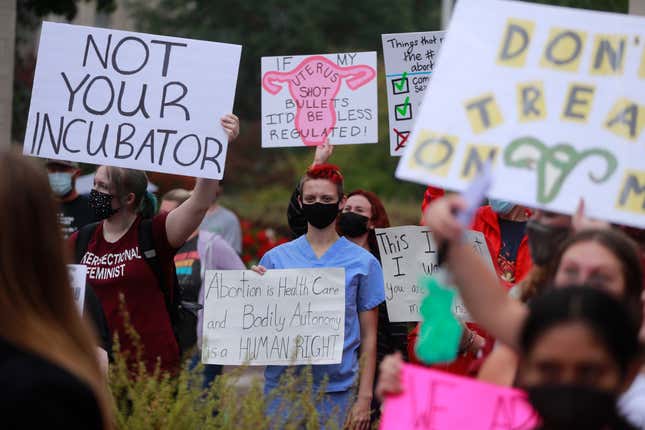Oklahoma and Idaho Are About to Pass Texas-Style Abortion Bans
Oklahoma saw a 2,500% increase in Texans seeking abortion since Texas enacted its near-total ban. Now, patients in both states could soon lose access to care.
NewsPolitics

Since Texas enacted SB8, a landmark, near-total abortion ban enforced via citizen surveillance and the threat of financially ruinous lawsuits to providers, nearly a dozen states have introduced copycat bills. This week, which marks the six-month anniversary of Texas’ ban taking effect, Idaho and Oklahoma are on the brink of becoming the first states to successfully pass their own iterations of SB8. These bans could take effect as early as April if signed into law.
Earlier this month, state Senate committees in Idaho and Oklahoma advanced their Texas-style bans, which arbitrarily ban abortion care at about six weeks before many people can realize they’re pregnant. Idaho’s full Senate is slated to vote on the bill, SB1309, this week, and while it’s not yet clear when Oklahoma’s full Senate will vote on their abortion ban, SB1503, advocates are bracing for the vote to take place soon. Idaho’s bill notably allows plaintiffs to sue only immediate family members who help someone have an abortion and the abortion provider for up to $20,000. Meanwhile, Oklahoma and Texas’ bills allow anyone who helps someone have an abortion—from their Uber driver to an abortion fund that helped them afford the procedure—to be sued for up to $10,000.
The governors of both Idaho and Oklahoma have already expressed support for these bans, and Oklahoma’s legislature is also considering a bill that would ban abortion at just 30 days, effectively robbing the state of abortion access. A spokesperson for Trust Women, an abortion provider with a clinic in Tulsa, told 19th News that they hadn’t anticipated the bill “would move this quickly.” And if SB1309 takes effect in Idaho, patients would have to travel an estimated average of 250 miles to their nearest abortion provider in either Washington state, Oregon, Wyoming, or Montana for care.
-

-

-

-

-

-

-

-

-

-

-

-

-

-

-

-

-

-

-

-

-

-

-

-

-

-

-

-

-

-

-

-

-

-

-

-

-

-

-

-








































